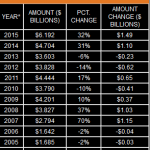The Union as a Safeguard against Domestic Faction and Insurrection
The Union as a Safeguard against Domestic Faction and Insurrection
Madison defined two approaches of curing the mischiefs of faction: the one, by eliminating its causes; the other, by controlling its effects. He also described two methods of removing the causes of faction: the one, by destroying the liberty which is essential to its existence; the other, by giving to every citizen the same opinions, the same passions, and the same interests. According to him, the latent causes of faction are thus sown in the nature of man; and we see them everywhere brought into different degrees of activity, according to the different circumstances of civil society. An eagerness for different opinions concerning religion, concerning government, and many other points, as well of thought as of practice, have, in turn, distributed manhood into parties, irritated them with common hostility, and reduced them much more prepared to displease and dominate each other than to collaborate for their common good.
He suggested that no man is allowed to be a judge in his own cause, because his interest would definitely bias his judgment, and, not unconvincingly, crooked his honesty. Justice ought to hold the balance between them. Yet the parties are, and must be, themselves the judges; and the most numerous party, or, in other words, the most powerful faction must be expected to prevail.
He said that that enlightened statesmen would be capable to regulate these conflicting benefits, and reduce them all submissive to the communal good. Rational statesmen will not always be at the helm. Nor, in numerous cases, can such an alteration be prepared at all deprived of captivating into opinion unintended and remote deliberations, which will hardly triumph over the instant importance which one party may find in ignoring the moralities of another or the good of the whole. The causes of faction cannot be eradicated, and that assistance is only to be required for monitoring its effects.
He further argued that if a faction involves less than a majority, relief is delivered by the republican principle, which permits the majority to defeat its threatening views by regular vote. It may obstruct the administration, it may tremble the society; but it would be unable to implement and cover its fierceness under the forms of the Constitution.
He believed that society consisting of a small number of citizens, who assemble and administer the government in person, can admit of no cure for the mischiefs of faction. A republic means a government in which the scheme of representation takes place, opens a different prospect, and promises the cure for which we are seeking. The two great points of difference between a democracy and a republic are: first, the delegation of the government, in the latter, to a small number of citizens chosen by the rest; secondly, the greater number of citizens, and greater sphere of country, over which the latter may be extended.
The other difference is, the greater citizens’ number and territory extent which may be brought within the scope of republican than of democratic administration; and it is this condition primarily which reduces factious amalgamations less to be feared in the past than in the later. The smaller the society, it would have fewer distinct parties and interests composing it.
He thought factious leaders influence may spark a flame within their particular States, but will be incapable to feast a general fire through the other States. A religious sect may pervert into a political faction in a part of the Association; but the diversity of sects spread over the whole face of it must safe the national councils against any endangerment from that source.





